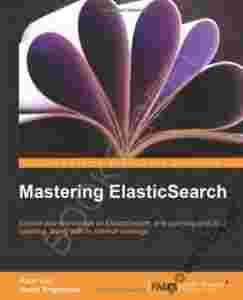|
ElasticSearch is fast, distributed, scalable, and
written in the Java search engine that leverages Apache
Lucene capabilities providing a new level of control
over how you index and search even the largest set of
data.
"Mastering ElasticSearch" covers the
intermediate and advanced functionalities of
ElasticSearch and will let you understand not only how
ElasticSearch works, but will also guide you through its
internals such as caches, Apache Lucene library,
monitoring capabilities, and the Java API. In addition
to that you'll see the practical usage of ElasticSearch
configuration parameters, monitoring API, and
easy-to-use and extend examples on how to extend
ElasticSearch by writing your own plugins.
"Mastering ElasticSearch" starts by showing you
how Apache Lucene works and what the ElasticSearch
architecture looks like. It covers advanced querying
capabilities, index configuration control, index
distribution, ElasticSearch administration and
troubleshooting. Finally you'll see how to improve the
user’s search experience, use the provided Java API and
develop your own custom plugins.
It will help
you learn how Apache Lucene works both in terms of
querying and indexing. You'll also learn how to use
different scoring models, rescoring documents using
other queries, alter how the index is written by using
custom postings and what segments merging is, and how to
configure it to your needs. You'll optimize your queries
by modifying them to use filters and you'll see why it
is important. The book describes in details how to use
the shard allocation mechanism present in ElasticSearch
such as forced awareness.
"Mastering
ElasticSearch" will open your eyes to the practical use
of the statistics and information API available for the
index, node and cluster level, so you are not surprised
about what your ElasticSearch does while you are not
looking. You'll also see how to troubleshoot by
understanding how the Java garbage collector works, how
to control I/O throttling, and see what threads are
being executed at the any given moment. If user spelling
mistakes are making you lose sleep at night - don't
worry anymore the book will show you how to configure
and use the ElasticSearch spell checker and improve the
query relevance of your queries. Last, but not least
you'll see how to use the ElasticSearch Java API to use
the ElasticSearch cluster from your JVM based
application and you'll extend ElasticSearch by writing
your own custom plugins.
If you are looking for
a book that will allow you to easily extend your basic
knowledge about ElasticSearch or you want to go deeper
into the world of full text search using ElasticSearch
then this book is for you.
|
|

